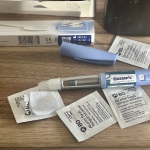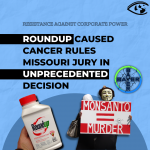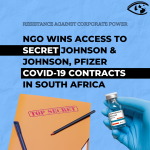World: AIDS Activists Mobilize Against Coca-Cola
AIDS activists are preparing rallies and demonstrations Thursday in several cities around the world to protest against global soft-drink giant Coca-Cola, which they charge must do more to help and treat its HIV-infected workers and their families in sub-Saharan Africa.
In the United States, protests are planned in front of Coke's Manhattan offices, in Washington, D.C., San Francisco, Seattle, Philadelphia, Pittsburgh, Milwaukee and on at least 12 university campuses, as well in Atlanta, the home of one of the world's best known multi-national corporations.
Protests are also scheduled to take place in Tokyo, Paris, Bangalore, and in at least half a dozen African cities from Burkina Faso to Zimbabwe, according to organizers which include the AIDS Coalition to Unleash Power, better known as ACT UP, and the Health Global Access Project (Health GAP).
"What's behind the Coke label is a company that neglects its workforce, that refuses AIDS treatment for children, and that puts profits over the lives of its workers," said Amanda Lugg of the New York chapter of ACT UP. "With all the profits the company makes off African laborers, Coke executives cannot morally justify refusing to pay for AIDS treatment for workers' children." Last year, the company reported net operating profits in Africa of some US$621 million.
Coca-Cola, which has long prided itself on charitable and community work, first announced in June 2001 that it would provide comprehensive healthcare benefits, including antiretroviral drug coverage to its 1,200 employees in Africa, and begin negotiations with its bottlers on providing similar coverage for their employees.
At the same time, its Coca-Cola Africa Foundation launched a partnership with UNAIDS to develop a number of programs to support the fight against HIV/AIDS, which kills roughly 6,000 Africans every day, including using its formidable marketing expertise to develop public awareness campaigns in the region.
But activists charged that its commitment to provide health coverage and anti-AIDS treatment to its employees was inadequate, particularly in light of the tens of thousands of workers employed by Coke's bottlers throughout Africa who would not receive coverage. The company has claimed that as many as 100,000 people work for its bottlers, although it recently reduced that estimate to only 60,000.
In response to these complaints, Coke's Africa Foundation announced a new program late last month for employees of 40 bottlers across Africa. Working with pharmaceutical giant GlaxoSmithKline, and other private-sector suppliers, it said it would offer access to anti-retroviral drugs to the employees and their spouses of any Coca-Cola bottler that chooses to participate, beginning with eight of the largest bottlers, at an estimated yearly cost of $4-5 million.
"No single organization can stand up to AIDS alone, but Coca-Cola Africa and its bottlers are determined to do their part," said Alexander Cummings, chairman of the Foundation and president of Coca-Cola Africa, September 26. "We are proud to work with our bottlers to provide access to a program that can help them offer their employees and spouses the HIV-AIDS-related care they need."
But activists expressed disappointment. "Even as a first step, the plan leaves the majority of Coke's workers and their dependents (in Africa) in a deadly lurch," said Sharonann Lynch of Health GAP. Noting that 15 months had passed since Coke first launched its campaign, she charged that the company's "glacial pace contradicts (its) rhetoric of compassion and action."
The activists say that the new initiative will cover only 35 percent of Coke's bottler workforce in Africa and that its proposed 50 percent cost-sharing scheme will be too expensive for small and medium-sized bottlers who together account for the other 65 percent. Moreover, the workers themselves will still be required to make a 10 percent co-payment on the anti-AIDS medicines.
While that may be a reasonable requirement if they could buy generic AIDS drugs, health groups voiced concern at Coke's partnership with GlaxoSmithKline and PharmAccess International which market their own, more expensive medications.
"Workers are too poor to cover a 10 percent co-payment on medicines, particularly at Big Pharma prices," according to Asia Russell of Health Gap who urged Coke to either subsidize the cost of all treatment or "bring generic companies to the negotiating table."
The groups are also calling for the company to extend health and AIDS coverage of employees and their spouses to their children and other dependents, as some other multi-national companies, including Heineken and Daimler-Chrysler have already committed themselves to do.
They are also demanding that Coke launch similar initiatives in other poor developing countries outside Africa, such as India and Southeast Asia where HIV infection rates are rising steeply. "Coke's solution should be global, not just where activists have turned up the heat the highest," said John Riley of ACT UP New York.
- 122 Pharmaceuticals



